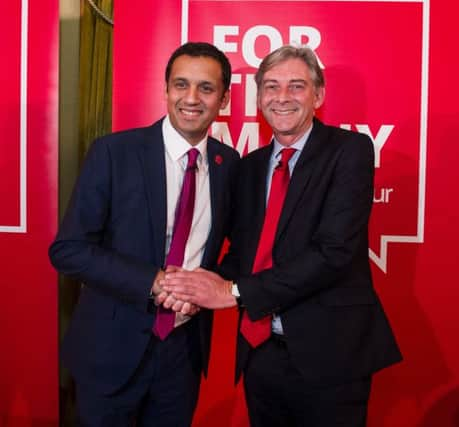Tom Peterkin: The daunting challenge faced by Scottish Labour's new leader


The leadership vacuum was caused by Alex Rowley’s decision to step down as acting leader after an ex-girlfriend made harassment allegations against him. Mr Rowley denies her claims, but this most serious turn of events is another unhappy episode in what has become the sorry decline of a political operation once regarded as the natural party of government in Scotland.
Since 2007 no fewer than six individuals have tried to steer HMS Scottish Labour through some seriously stormy political waters.
Advertisement
Hide AdAdvertisement
Hide AdJack (now Lord) McConnell, Wendy Alexander, Iain Gray, Johann Lamont, Jim Murphy and Kezia Dugdale have all assumed control of the party with high hopes, only to become the inhabitants of a seemingly interminable Holyrood soap opera.
Last night it was left to that trooper Jackie Baillie to step into Mr Rowley’s shoes and fill the leadership vacuum. The good news – for Ms Baillie – is that she is only in charge for three days.
This coming Saturday will see the next episode of the Scottish Labour soap opera. A new party leader will be elected when either Anas Sarwar, the moderate candidate, or Richard Leonard, the left-winger favoured by Corbynistas, becomes the seventh official leader in little more than a decade.
With Scottish Labour being Scottish Labour, it goes without saying that the contest between the two men has been a divisive affair, full of controversy and unpleasantness.
For ten long weeks, battle has raged between Mr Sarwar and Mr Leonard as they have fought to replace Ms Dugdale, whose unexpected resignation came amid claims she was being undermined by left wingers.
Since her resignation, the fault line between Jeremy Corbyn’s supporters on the left and the Blairite faction has been laid bare as the two candidates and their supporters have clashed.
Among the “highlights” has been Mr Rowley being caught on tape suggesting he favoured Mr Leonard, despite previous assurances that as caretaker leader he would have a neutral stance.
The integrity of the contest itself has been questioned by both sides.
Advertisement
Hide AdAdvertisement
Hide AdMr Sarwar had concerns over the way the Unite union, which supports Mr Leonard, had recruited members to give them a vote in the contest. The union has always maintained that it has acted within party rules.
Meanwhile a recruitment drive for Mr Sarwar was hit by claims that many appeared to share mobile phone numbers. Mr Sarwar also maintains that there has been no wrongdoing.
Newspaper reports quoting concerns that members with “Asian sounding names” were being recruited led to Mr Sarwar warning that the party’s membership should not be “racially profiled”.
Mr Sarwar’s leadership bid has seen him criticised for sending his children to a fee-paying school. And there were suggestions that the Sarwar family cash-and-carry firm, United Wholesale (Scotland), did not pay all its workers the real living wage. The furore saw Mr Sarwar relinquish his shares in the business – said to be worth around £4.8 million.
As the contest developed, the received wisdom was that the support of the trade unions and enthusiasm for Mr Corbyn would make it a skoosh for Mr Leonard. Despite this, Mr Sarwar’s camp sees grounds for optimism. Of the 4,000 new ordinary members who have joined Labour – taking its numbers up to 25,000 in Scotland – the vast majority are said to be pro-Sarwar.
The great imponderable is the conclusion reached by the additional 11,000 trade union affiliate members, who are also eligible to vote. The assumption is that they are where Mr Leonard’s powerbase lies. Much depends, however, on how many of them actually take part and whether there happens to be a substantial number of them who turn out to be Sarwar supporters.
Looking ahead, the first priority for whoever wins will be to try and unite what appears to be a hopelessly divided and chaotic party.
To their credit, both candidates have pledged to work for unity regardless of whether they win or lose. But whether their supporters can set aside old animosities remains to be seen.
Advertisement
Hide AdAdvertisement
Hide AdIn the long run, whoever wins faces massive challenges. Should Mr Sarwar win, it seems likely that his moderate leanings will clash with the UK leadership. Rightly or wrongly, his choice of education will continue to be an issue.
And his personal wealth and the activities of the Sarwar family business will be fodder for the SNP. Just a few weeks ago, Mr Rowley only had to utter the word “millionaire” at First Minister’s Questions for the SNP to fall about laughing while gesturing towards Mr Sarwar.
For Mr Leonard, the challenges are different. He may end up as Mr Corbyn’s apostle in Scotland, but success at the polls depends on winning the moderate voters in Middle Scotland.
It is instructive that despite Mr Corbyn exceeding expectations in the general election and the UK government being in dire straits, Labour still cannot achieve a substantial lead in the polls. Much work is required to make HMS Labour seaworthy.